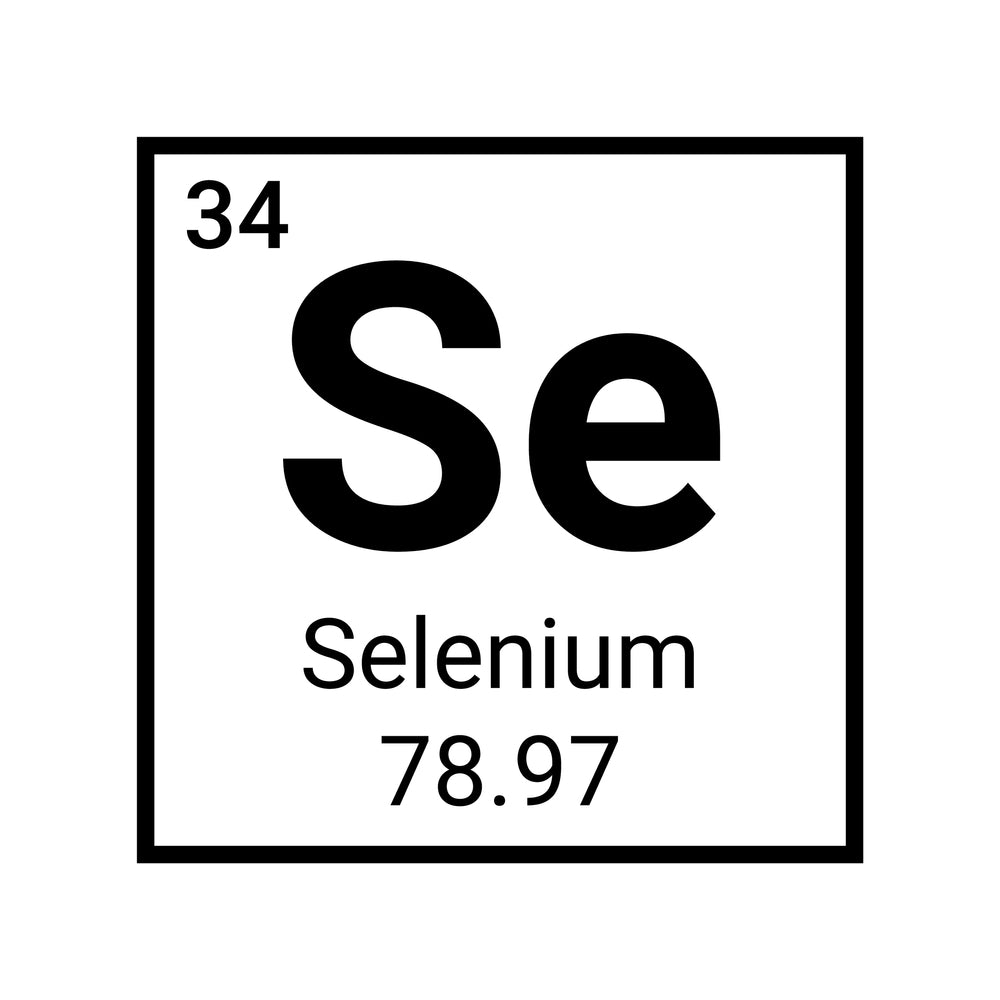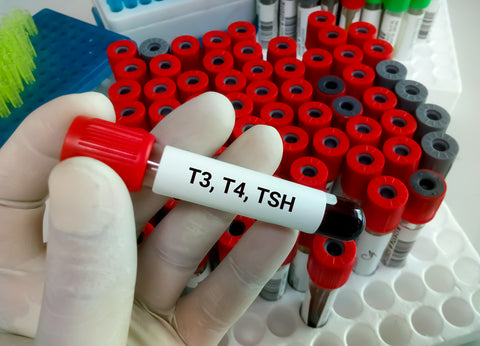Your cart is empty
Free shipping on all US orders


Free shipping on all orders

When you hear about Selenium, what comes to mind? For some people, images of transformers and heavy metal stuff is conjured in their mind. Mind you- that's Titanium, not Selenium!
Rather, Selenium is a mineral that is needed in very small amounts for optimal health. So small that it is actually measured in micrograms.
Nevertheless, failing to acknowledge its important can be detrimental to your health, having far-reaching implication on numerous systems and organs.
What does it play a role in? Let's take a look at some noteworthy ones.
Selenium is integral to the thyroid, the small gland in your neck that's a powerhouse for hormone production, regulating your metabolism, body temperature, and more. The thyroid produces two main hormones: thyroxine (T4) and triiodothyronine (T3). T4 is the inactive form, which needs to be converted to T3, the active form, for your body to use it. This is where Selenium plays a crucial role.

Selenium plays a key role in the synthesis of enzymes known as deiodinases. These enzymes are responsible for the conversion of T4 into T3. Without enough Selenium, your body struggles with this conversion process, potentially contributing to a condition known as hypothyroidism, where there is insufficient levels of active thyroid hormone. Symptoms of hypothyroidism include fatigue, weight gain, and abnormal feelings of cold.
But Selenium's role doesn't stop at hormone conversion. It also helps in maintaining the overall health of the thyroid gland. The thyroid has the highest Selenium content per gram of tissue in your body. This is because Selenium-based proteins are essential for protecting the thyroid gland from oxidative damage during hormone production.
The thyroid generates hydrogen peroxide as a byproduct when it's making thyroid hormones. Normally, this is harmless, but in excessive amounts, it can cause damage. Selenium-based proteins neutralize this excess hydrogen peroxide, keeping the thyroid cells safe and functioning properly.
Quite a lot of work to be done by this trace mineral, isn't there?
When it comes to the health of the cardiovascular system, we often hear about avoiding certain foods or exercising more, but minerals like Selenium seldom get the limelight. However, Selenium plays a pretty significant role in keeping our hearts ticking along nicely.
Selenium is a real sleeper as it relates to heart health. It's a trace mineral, which means our body needs it in tiny amounts, but its impact is potentially huge.
How does it support the heart? One of the key ways is through its antioxidant properties. You see, oxidative stress is a big deal for the heart. It's like rust on a car – it can slowly damage the heart's cells until the effect is irreversible. Selenium, with its antioxidant powers, helps to reduce this oxidative stress, protecting heart cells from damage.
The source of this anti-oxidant potential? Well, Selenium is a crucial component of a group of enzymes called glutathione peroxidases. These enzymes can be considered the cleanup crew of the body, mopping up harmful free radicals that can damage cells, including those in the heart. By reducing oxidative stress, Selenium also indirectly helps to prevent the buildup of plaque in the arteries, a condition known as atherosclerosis, which can lead to heart attacks, strokes, and other
Selenium also plays a role in reducing inflammation, another key factor in heart disease. Inflammation in the body can lead to the development of plaque in the arteries, and eventually, this plaque can break off, leading to a heart attack or stroke. By keeping inflammation in check, Selenium helps to keep the arteries clear and blood flowing smoothly.
There's some evidence that also suggests that Selenium can help regulate cholesterol levels. High levels of bad cholesterol (LDL) are a major risk factor for heart disease. Selenium can influence the metabolism of lipids in the body, potentially helping to keep cholesterol levels within a healthy range.
When we think about boosting our immune system, we often turn to vitamin C or echinacea, but Selenium? Nah. This little mineral, however, often overlooked, plays some big roles in keeping our immune system in top shape.
Of key mention is Selenium's role as an antioxidant. This is a big deal for our immune cells. See, when our immune system is fighting off invaders like bacteria or viruses, it generates a lot of reactive oxygen species (ROS) – kind of like the exhaust fumes from a car.

While ROS are useful for attacking pathogens, they can also cause damage to our cells if they're not kept in check. That's where Selenium comes in.
It's a key player in antioxidant enzymes, which help to neutralize these ROS. In other words, you can say that Selenium helps to clean up the mess left behind after our immune system does its job.
But Selenium's role isn't just about damage control. It also directly affects how our immune system functions. Selenium deficiency has been linked to a weaker immune response. For example, a lack of Selenium can lead to slower immune cell response and a reduced ability to develop and mobilize those cells that fight off infections.
On the flip side, adequate Selenium levels can enhance the proliferation and function of various immune cells, including T cells, which are like the special ops forces of our immune system.
Selenium’s action of controlling inflammation is helpful in this regard, too. While inflammation is a natural part of the immune response, too much of it can be harmful.
Selenium helps regulate the production of prostaglandins, which are compounds involved in inflammation. By keeping this in balance, Selenium ensures that the immune response is effective but not excessively inflammatory.
When it comes to maintaining mental health focus on lifestyle factors like stress management and sleep are undoubtedly effective, but what about the role of nutrients like Selenium? It's not usually the first thing that springs to mind, yet it's very important.
So, what's the deal with Selenium and the brain? A good analogy is to think of the brain as if it's a high-performance vehicle; it needs the right kind of fuel and maintenance to function at its best.
Selenium is part of this essential maintenance. It's a powerful antioxidant, and this is super important for the brain, which is particularly vulnerable to oxidative stress. Oxidative stress, over time, can cause wear and tear. In the brain, this oxidative damage can contribute to cognitive decline and even affect mood. Selenium helps to protect the brain from this kind of damage.

But there's more to Selenium's role in mental health than just being a brainy bodyguard against oxidative stress. It's also involved in brain signaling. Yes, Selenium plays a part in the communication network of your brain.
It's a component of selenoproteins, which are involved in various brain functions, including mood regulation and cognitive function.
Speaking of mood regulation, studies have found a link between low Selenium levels and an increased risk of depression, anxiety, and fatigue. It seems that maintaining adequate Selenium levels could help in keeping the mood more balanced.
This doesn't mean Selenium is a cure for mental health issues, but it's definitely a player in the intricate game of maintaining mental well-being.
The relationship between Selenium and the thyroid also ties back to mental health. The thyroid, which regulates several hormones, has a significant impact on mood and cognitive function. Since Selenium is essential for healthy thyroid function, it indirectly supports mental health by ensuring the thyroid gland works as it should.
It's a topic that doesn't get as much attention as it should, considering how crucial Selenium is in this area. Yet, men are mostly ashamed to discuss matters related to their sexual or reproductive health. For this reason, prevention is of the utmost importance.
Starting with the basics, and as we mentioned before, Selenium is essential for the proper functioning of the thyroid gland. Now, why does this matter for men's health?

Well, the thyroid regulates a whole host of hormonal activities in the body, including metabolism and energy levels. A well-functioning thyroid means hormones are in balance, which is key for overall health and well-being, including sexual health.
But where Selenium really stands out is in its role in male fertility, particularly concerning sperm health. Sperm cells are surprisingly sensitive to oxidative damage – think of them as tiny, fragile things that need protection.
Selenium, being a potent antioxidant, provides this protection. It shields sperm from oxidative stress, which can otherwise lead to damaged sperm DNA, reduced motility (the sperm's ability to swim), and overall decreased fertility.
Then there's the testosterone angle. Selenium is involved in the synthesis and metabolism of testosterone, the main male sex hormone. This hormone isn’t just about sex drive; it plays a crucial role in muscle mass, bone density, and red blood cell production. Optimal testosterone levels are essential for good health in men, and Selenium helps maintain this balance.
Another interesting aspect is Selenium's potential role in preventing conditions like erectile dysfunction. While the research here isn't conclusive, it's an area of interest. Erectile dysfunction can be linked to various factors, including vascular health, and Selenium’s properties might help in maintaining good blood flow.
But here’s an important thing to remember: it's all about balance. Having the right amount of Selenium is key. Too little can lead to problems, like reduced sperm quality or hormonal imbalances, but too much isn't good either and can actually be detrimental.
How about its highly touted use in mitigating issues related to an aging prostate gland? Yes, there's also evidence suggesting that Selenium can influence cell growth and apoptosis (programmed cell death) in the prostate. This is crucial because the controlled growth and death of cells are essential processes in maintaining healthy tissue and preventing the development of cancer. Selenium is thought to help regulate these processes in the prostate, potentially reducing the risk of prostate cells proliferating cancerous changes.
Several studies have also explored the relationship between Selenium intake and the risk of prostate cancer, with some suggesting that higher Selenium levels might be linked to a lower risk of prostate cancer.
However, it's important to note that the results have been mixed, and more research is needed to fully understand this relationship.
In addition to these direct effects on the prostate, Selenium's role in overall immune system health and its anti-inflammatory properties might also contribute to prostate health. A well-functioning immune system is better equipped to identify and eliminate abnormal cells, including potential cancer cells in the prostate.
Selenium isn’t that difficult to come by in actuality. It can be found in a variety of foods, making it accessible through a balanced diet. Here are some popular sources of Selenium:
The recommended daily intake (RDI) of selenium stands at 55 micrograms, although special categories of people may require small amounts more.
It is best to not exceed this RDI by too much, or adverse effects such as bloating, vomiting, and diarrhea are possible.
Selenium really needs to be paid more attention to, even though most people who eat a balanced diet are unlikely to be deficient in this mineral. Your daily dose of Fortify will more than meet your needs and keep your health optimized.